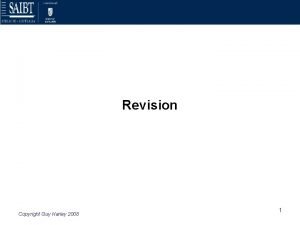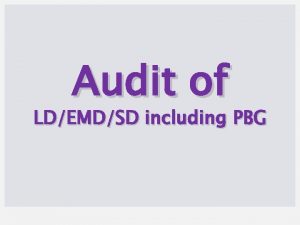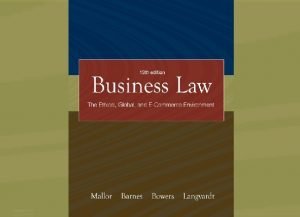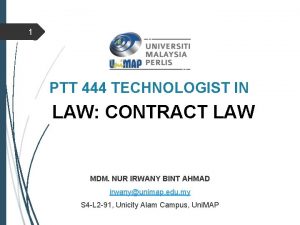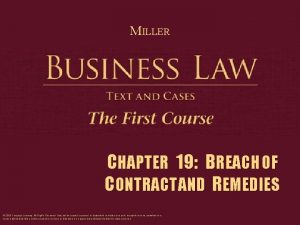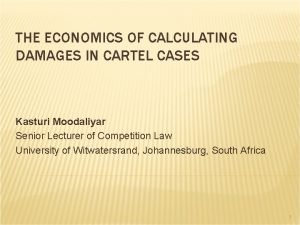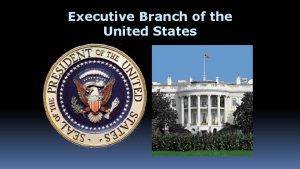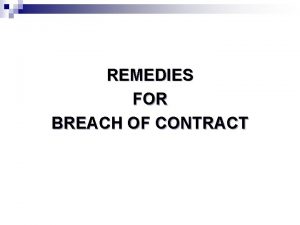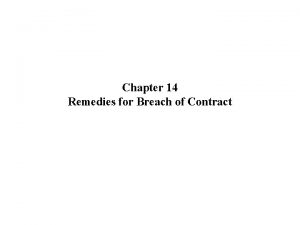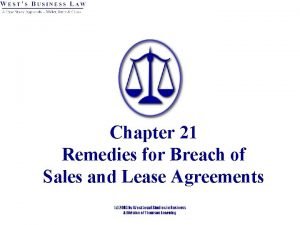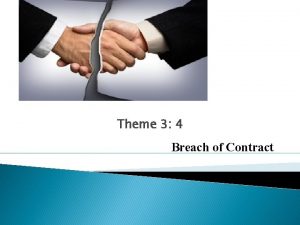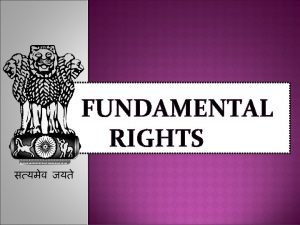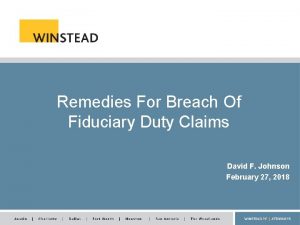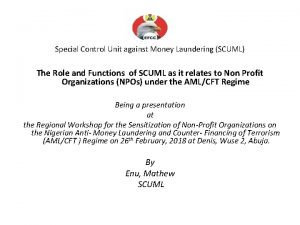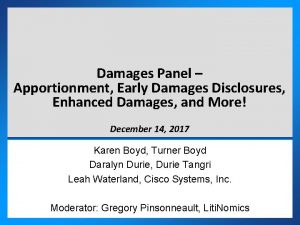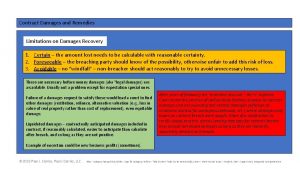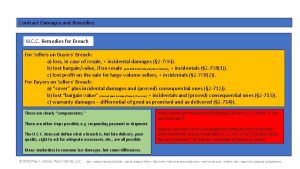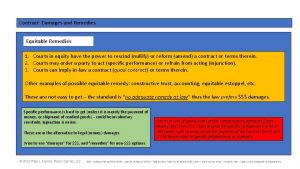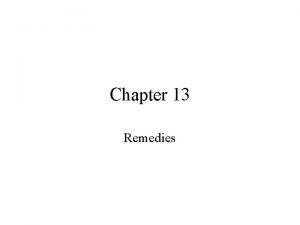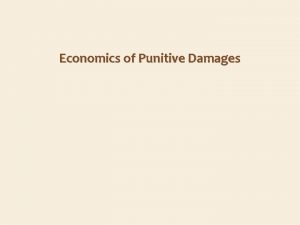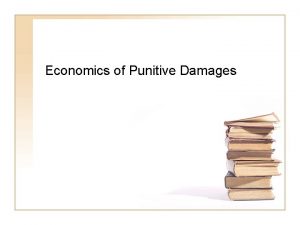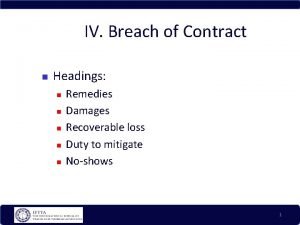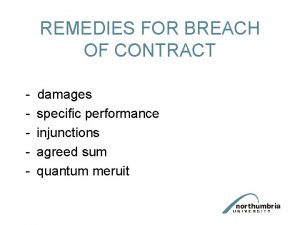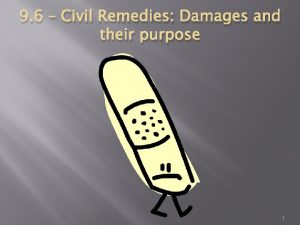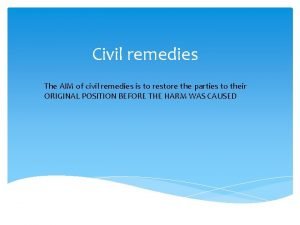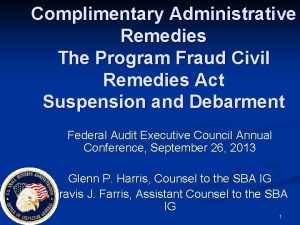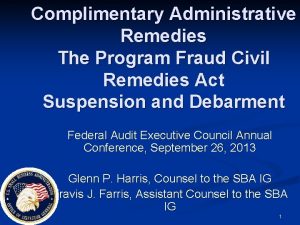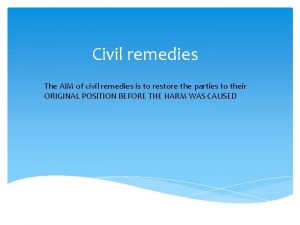Remedies Against Trustee 1 1 Money Damages trustee





![1. Money Damages (trustee in breach) � 4. Punitive damages “[A]n intentional breach of 1. Money Damages (trustee in breach) � 4. Punitive damages “[A]n intentional breach of](https://slidetodoc.com/presentation_image_h2/970647d72d9f76a0ec1affc1c1b30537/image-6.jpg)

















- Slides: 23

Remedies Against Trustee 1

1. Money Damages (trustee not in breach) -- § 114. 001 �Any profit through or arising out of the administration of the trust. Exception for trustee’s compensation 2

1. Money Damages (trustee in breach) -- § 114. 001 � 1. Lost value to trust Causation required No requirement that trustee personally benefited 3

1. Money Damages (trustee in breach) -- § 114. 001 � 2. Profit made by trustee Causation required No requirement that trust have suffered a loss 4

1. Money Damages (trustee in breach) -- § 114. 001 � 3. Lost profits Causation required Difficult to show 5
![1 Money Damages trustee in breach 4 Punitive damages An intentional breach of 1. Money Damages (trustee in breach) � 4. Punitive damages “[A]n intentional breach of](https://slidetodoc.com/presentation_image_h2/970647d72d9f76a0ec1affc1c1b30537/image-6.jpg)
1. Money Damages (trustee in breach) � 4. Punitive damages “[A]n intentional breach of a fiduciary duty is a tort justifying the award of exemplary damages. ” 6

2. Remove trustee -- § 113. 082 �Grounds are discretionary Evaluated under “abuse of discretion” standard 1. Trustee has materially violated the trust (or attempted to do so) AND Trust suffered a material financial loss. 7

2. Remove trustee -- § 113. 082 2. Trustee becomes incompetent 3. Trustee becomes insolvent 4. For other cause, in the discretion of the court 8

2. Remove trustee -- § 113. 082 � Court’s “attitude” toward removal Reluctant to remove settlor-chosen trustee. Hesitant to remove because of conflict between trustee and beneficiary. 9

2. Remove trustee -- § 113. 082 � Consequences of Removal Court may deny all or part of trustee’s compensation. Removal may be treated as breach of trust. 10

2. Remove trustee �Ditta v. Conte – Texas Supreme Court 2009 – p. 647 “[N]o statutory limitations period restricts a court’s discretion to remove a trustee. A limitations period, while applicable to suits seeking damages for breach of fiduciary duty, has no place in suits that seek removal rather than recovery. ” 11

3. Decree to carry out the trust Trustee, Do your job! Judge 12

4. Injunction �Used if trustee threatens to commit a breach of trust. �If trustee does not obey, punishable as contempt. 13

5. Receivership �Used when court fears trustee will not obey injunction. “Receivership is an extraordinary harsh remedy and one that courts are particularly loathe to utilize. ” 14

6. Require or increase bond 15

7. Declaratory Judgment �Court may determine any question arising during the administration of a trust. Civ. Prac. & Rem. Code § 37. 005 16

8. Award Attorney Fees -- § 114. 064 �Standard = equitable and just. �Award may be against any party. �Thus, all parties should request fees. 17

9. Criminal Sanctions – Penal Code § 32. 45 18

9. Criminal Sanctions – Penal Code § 32. 45 Misapplication by Fiduciary �State of mind Intentional Knowing Reckless 19

9. Criminal Sanctions – Penal Code § 32. 45 Misapplication by Fiduciary �Evil Act Misapply trust property which involves ▪ In violation of trust instrument, or ▪ In violation of Trust Code, and Substantial risk of loss to beneficiary 20

9. Criminal Sanctions – Penal Code § 32. 45 Misapplication by Fiduciary �Penalty If amount involved greater than $300, 000, up to life sentence. No requirement that trustee have personally benefited. ▪ If trustee personally benefited, then it may also be theft under Penal Code Chapter 31. 21

10. Liability for acts of prior trustee § 114. 002 � 1. Knowledge New trustee knows (subjective), or New trustee should know (objective) and 22

10. Liability for acts of prior trustee § 114. 002 � 2. Improper Conduct Allows bad conduct to continue, or Fails to make reasonable effort to compel old trustee to deliver trust property, or Fails to make reasonable effort to compel redress of breach (e. g. , sue prior trustee). 23
 Money money money team
Money money money team Liquidated damages definition
Liquidated damages definition Ld damage
Ld damage Liquidated damages
Liquidated damages Ignatius v bell
Ignatius v bell Liquidated damages
Liquidated damages Before and after method damages
Before and after method damages Smoking damages your lungs
Smoking damages your lungs The damages of the bureaucracy political cartoon meaning
The damages of the bureaucracy political cartoon meaning Acid rain remedies
Acid rain remedies Remedies for breach of contract
Remedies for breach of contract Remedies for breach of contract
Remedies for breach of contract Causes of acid rain in germany
Causes of acid rain in germany Remedies for breach of contract
Remedies for breach of contract Remedies for breach of contract
Remedies for breach of contract Examples of homely remedies
Examples of homely remedies Requirements for mora debitoris
Requirements for mora debitoris Self appointed mindguards
Self appointed mindguards Right to constitutional remedies article 32 to 35
Right to constitutional remedies article 32 to 35 Breach of fiduciary duty remedies
Breach of fiduciary duty remedies Right to constitutional remedies
Right to constitutional remedies Washington homeopathic
Washington homeopathic Scuml
Scuml Global programme against money laundering
Global programme against money laundering

